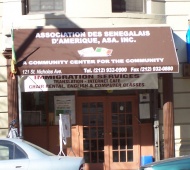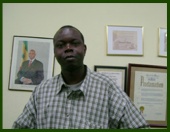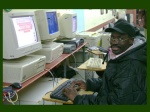Organizations
From The Peopling of New York City

| ||||||||
|---|---|---|---|---|---|---|---|---|
Association of Senegalese in AmericaOur Visit to the AssociationWe swiftly got off the B train at 116th Street to visit the Association of Senegalese in America (ASA). As we were walking down 116th Street between Fredrick Douglas Blvd and St. Nicholas Ave we saw, heard, and experienced Senegal. When we walked into the office of ASA, many of the Senegalese men greeted us with a warm reception. We sat down at the back of the office, in hopes of better understanding what goes on in ASA, besides the extensive descriptions about the role of ASA on a pamphlet that one of these men handed out to us. From our visit to ASA, it was evident that the organization was like a second home for many of the Senegalese immigrants living in “Little Senegal”. In the office, there were several Senegalese men sitting in front of computers, looking very determined to try and learn the functions of the complicated machine. Right behind them was a wall posted with different fliers, including ones advertising English classes for both adults and children and after-school programs. The organization also offers computer classes so that Senegalese immigrants can utilize the internet to find jobs. Lining the wall of the office were pictures and newspapers clipping of the Senegalese and many ASA members partaking in public conferences or celebrations. The Environment of the AssociationDuring our visit, many Senegalese men gathered around in the office to chat about current events or have heated discussions on political figures involved in the current election in Senegal. Although they are living in the United States, they are well-informed about current events in Senegal through the media, especially through the radio and newspapers, which are organized by ASA. The discussions can last anywhere from ten minutes to ten hours, depending on the subject of conversation. And Senegalese men who have just walked into the office can easily join the group and chat with one another. The ASA also has connections with higher authority figures in the Senegalese community, such as the Senegalese ambassador to the UN. We vividly remember when our first guide, Aissatou, smiled excitedly while pointing at a large picture on the wall of herself and Mayor Michael Bloomberg. She proudly told us she was part of a festival and that she was one of the people who got to meet Mayor Bloomberg. The networks between fellow Senegalese residents and other notable social individuals are like the ones mentioned by Paul Stoller in his book Money Has No Smell. Often, these networks help immigrants from all backgrounds find jobs and other beneficial opportunities in a new country. The Association of Senegalese in America on 116th Street in Harlem is where most of the Senegalese and other West African immigrants like to spend their time. The ASA plays an important role in providing various kinds of services and support for Senegalese immigrants. Assistance Provided by ASAAssistance provided by the ASA comes in many forms. Most of the assistance deals with domestic issues, such as domestic violence and divorce. The association also tries to educate people by giving English and computer training classes, as well as providing after school programs for children. Finally, they address both healthcare issues, like information about the flu vaccine and access to free medical consultations, and immigrant issues, like housing. Providing English education is extremely important; we saw the impact of language firsthand when we encountered a Senegalese man who ran into the office clutching a newspaper article. He seemed very anxious to learn what the article was about, and we watched as he gave the article to Kate Newman, a regular volunteer. Kate smiled and translated the article into French. As she began to read, he looked more anxious. After learning the content of the article, however, the man looked delighted and surprised, and went over to a group of Senegalese men in the office to show them the article. Kate explained to us that the article was about him, because a reporter had interviewed him about the community. Kate is a senior at Bard College who dedicates most of her time to the ASA, volunteering to teach English and Computer Classes and helping out the Senegalese community. In addition, she informed us that many Senegalese who are unable to read English often come to her with bills, articles, letters, and other documents to translate. The ASA also organizes activities specific to the culture of the Senegalese community. These cultural activities bond the Senegalese immigrants together and help to reduce the tensions between the Senegalese and other community groups around 116th Street. As mentioned in Nancy Foner's New Immigrants in New York, confrontations between African-Americans and West Africans sometimes occur. However, cultural events help bring these two nationalities together.
Other OrganizationsAlthough it is a major organization, the Association of Senegalese in America is by no means the only organization in America that takes part in helping the Senegalese immigrants adapt to their new life in a new country. There are also other organizations that aid the immigrants in obtaining a better education, such as the Senegalese Education Fund Organization and the Senegalese Academic Society. Senegalese Education FundThe Senegalese Education Fund was originally started in Senegal by Judith Kader Brenner, a Peace Corp Volunteer. The non-profit organization takes part in fund-raising to support two scholarships for Senegalese students and also sponsors a Girls Club. Senegalese Academic SocietyThe Senegalese Academic Society is another great non-profit organization. It was set up by the Senegalese to facilitate students in getting a wider perspective of the different African cultures around them, including their own. The organization emphasizes scientific and other educational projects that will help immigrants of Senegalese background and people back in Senegal. It also tries to develop research projects that allow other ethnicities to learn about the achievements and experiences of the Senegalese in America.
Interview With Kate NewmanBy Janet Shin For our wiki, I interviewed Kate Newman, a friend whom we have all met when we visited the Senegalese Association. Kate is currently double majoring in anthropology and African studies at Bard College. She is in New York to take classes related to her major at Columbia University. Kate is from Chicago, and is now living in the Upper West Side. She has studied in various parts of the world, including Senegal and Paris. Kate is fluent in French, English, Wolof, and Spanish. Q: Kate, can you tell us how you came to create “Friends of Senegal”? A: Well, before I came up with the idea, I was working on my senior thesis on African Americans and Senegalese. I started teaching English at the Senegalese Association, since I wanted to conduct a field research for my thesis. As I spent more time at the association, it came to me that it might be great if I created an organization like “Friends of Senegal”. Since my major is Anthropology, I needed to be at the center for the majority of my free time. Also, I wanted to create this because I wanted to give back to Senegalese people – when I visited Senegal last summer, I truly had a wonderful time. The people there had big hearts and treated me like I was an old friend. This was actually how I became interested in Senegalese people in New York. Since I was unable to contribute something to the Senegalese community in Senegal, I thought that I might be able to do something for the community here in New York. Q: Can you tell us about the projects that are currently being carried out by “Friends of Senegal”? A: We are currently trying to set up a tutoring network for students, and we are also holding sessions on how to use computers. The organization also plans community lunches and free medical events. For right now, my goal is creating a library in the Senegalese Association before my departure. Q: In your experience as the creator and director of “Friends of Senegalese,” can you tell us any memorable moments? A: There were two of them. The first time was when I had a chance to meet the Counsel General of Senegal (Amadou Bocoum), and discuss how my organization was bringing changes in the Senegalese neighborhood. I really felt honored when he expressed how glad he was to meet me in person. The second time was when I had an opportunity to tutor a man who could not even write his name in both English and French. After two hours of intense writing, he was able to write his name in both English and French, and even write my name! I was really glad, since I made a small difference in his life, despite all the limitations that I face every day at the Senegalese Association. It is quite difficult since I have limited resources – half of the computers in the association are broken, and people scheduled for tutoring often fail to show up without any notification. Still, you must understand the differences of the two cultures. Q: Can you explain about the differences? A: The problem basically stems from mixing American and Senegalese point of view. The idea of living by the American definition of a “deadline” is considered as something unnecessary by many Senegalese people. When I often have to leave the Senegalese Association to run my errands, people ask me, “What is the use of running errands when you cannot spend time with the people you love?” Q: In the beginning of the interview, you mentioned something about leaving the Senegalese community in New York. Is this true? A: Yes. This summer, I will be visiting Senegal this summer to further my research on Senegalese people. There, I will be participating in an organization that is similar to “Friends of Senegal;” it is only that I was not the one who created it. I also want to visit my friends there, and rest. Next year, I will be visiting Australia, Argentina, and India through a fellowship program on a study of children’s museums. Q: Any words to students of CHC 10201 students, and people interested in pursuing what you did in the Senegalese community? A: If anyone is interested in following up with, or even starting a new organization to help the Senegalese community, it will be a worthwhile experience, since you will learn so many things. I am just afraid that when I leave, everything that I have established in the community will fall apart. I really appreciate Professor Ebin and the students of CHC 10201 for participating so actively in the Senegalese community. |


